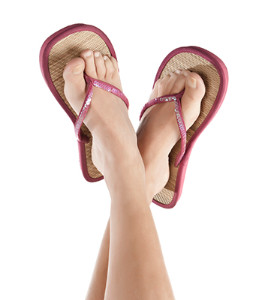 Many people enjoy the ease of wearing flip-flops. They are a simple shoe, easy to wear, and designed in a variety of colors. Despite their popularity, there are foot conditions that can develop from wearing this type of shoe. Ligaments and tendons may slowly pull out of alignment, and a bunion can form. Additionally, if there is little or no arch support, this may trigger the onset of heel pain, which could be indicative of plantar fasciitis or heel spurs. Many flip-flops are constructed of a porous material, and this can be the perfect area for fungus to grow. This can lead to athlete’s foot and toenail fungus. If flip-flops are frequently worn, hammertoe can develop as a result of the toes grasping the shoe to stay on the foot. If you would like additional information about the consequences of wearing flip flops, please consult with a podiatrist.
Many people enjoy the ease of wearing flip-flops. They are a simple shoe, easy to wear, and designed in a variety of colors. Despite their popularity, there are foot conditions that can develop from wearing this type of shoe. Ligaments and tendons may slowly pull out of alignment, and a bunion can form. Additionally, if there is little or no arch support, this may trigger the onset of heel pain, which could be indicative of plantar fasciitis or heel spurs. Many flip-flops are constructed of a porous material, and this can be the perfect area for fungus to grow. This can lead to athlete’s foot and toenail fungus. If flip-flops are frequently worn, hammertoe can develop as a result of the toes grasping the shoe to stay on the foot. If you would like additional information about the consequences of wearing flip flops, please consult with a podiatrist.
Flip-flops can cause a lot of problems for your feet. If you have any concerns about your feet or ankles, contact one of our podiatrists from Summit Podiatry. Our doctors will assist you with all of your foot and ankle needs.
Flip-Flops and Feet
Flip-flops have managed to become a summer essential for a lot of people. While the shoes may be stylish and easy to slip on and off, they can be dangerous to those who wear them too often. These shoes might protect you from fungal infections such as athlete’s foot, but they can also give you foot pain and sprained ankles if you trip while wearing them.
When Are They Okay to Wear?
Flip-flops should only be worn for very short periods of time. They can help protect your feet in places that are crawling with fungi, such as gym locker rooms. Athlete’s foot and plantar warts are two common fungi that flip-flops may help protect your feet against.
Why Are They Bad for My Feet?
These shoes do not offer any arch support, so they are not ideal for everyday use. They also do not provide shock absorption or heel cushioning which can be problematic for your feet. Additionally, you may suffer from glass cuts, puncture wounds, and stubbed toes since they offer little protection for your feet.
More Reasons Why They Are Bad for Your Feet
- They Slow You Down
- May Cause Blisters and Calluses
- Expose Your Feet to Bacteria
If you have any questions, please feel free to contact one of our offices located in Wilmington, Whiteville, and Wallace, NC . We offer the newest diagnostic and treatment technologies for all your foot care needs.
